Oct 2007
Joey Bishop: "Anybody tells you you're a good audience, you punch 'em right in the mouth."
23/10/07 11:47
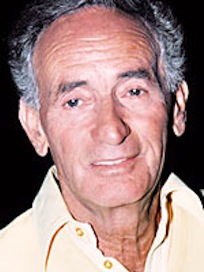
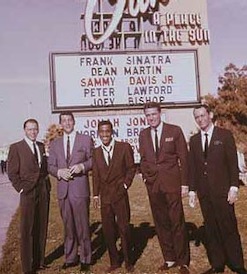
Note to readers: There's been quite a demand for this. Shortly after Frank Sinatra's death, I journeyed to Lido Isle, Calif. to interview Joey Bishop, the last surviving member of the "Rat Pack." We got along, sometimes not so famously, during a long and winding interview session at his musty bayside home. Bishop, who died on Oct. 17th at age 89, made it clear that he still harbored considerable bitterness about a lot of things. Originally printed on Aug. 16, 1998, here's the last extended interview with, in his view, the man who made the Rat Pack tick.
By ED BARK
LIDO ISLE, Calif. -- Joey Bishop, pack rat and former Rat Packer, is at home amid his mementos, thumbing through a picture book from John F. Kennedy's inaugural gala, which he emceed.
"Here Frank was saying, 'I didn't know you could sing.' I told him, 'Are you kidding? I hit notes only Jewish dogs can hear.' "
His listener, sharing a sofa with him, summons a perfunctory chortle. It turns out to be less than Bishop expected. Pause, one-two. "Anybody tells you you're a good audience," he retorts, "you punch 'em right in the mouth. Ya hear?"
It's been a long day with the alternately convivial and cranky survivor of times when Frank Sinatra, Dean Martin, Sammy Davis Jr., Peter Lawford and he combined to redefine swagger.
The Rat Pack. Endless recess. Ring-a-ding-ding. But now the bells have tolled:
Peter Lawford -- Sept. 7, 1923, to Dec. 25, 1984
Sammy Davis Jr. -- Dec. 8, 1925, to May 16, 1990
Dean Martin -- June 7, 1917, to Dec. 25, 1995
Frank Sinatra -- Dec. 12, 1915, to May 14, 1998
That leaves Joey, who at age 80 is both a reluctant torchbearer and increasingly a Bishop intent on being remembered as more than a pawn. "I gave them all those lines, man!" he asserts. "Nobody could out ad-lib me in good taste."
As proof, he fetches a 35-year-old Time magazine article that acknowledged his existence back when the Rat Pack held its raucous "Summit" meetings onstage at the now-defunct Sands Hotel.
"Can you read this paragraph right here?" he asks. "You can read it out loud if you'd like."
It reads like this: "Joey's quips are delivered with a warmth that never wounds. Even the self-protective Sinatra loves them. The 'Summit' session at the Sands was made possible . . . "
"Where the hell are you reading?" an annoyed Bishop interjects. "I think I gave you the wrong . . . "
We regroup and finally find Bishop's Rosebud: "The nightly 'meetings' could not have come off without the speaker of the house, Joey Bishop, the hub of the big wheel."
So there. Stick that in your typewriter if you dare. Still, Bishop immediately insists, "I never got any credit. Who was I, with Frank, Dean, Sammy and Peter Lawford up there? Who was I? You understand? Your lack of knowledge of me!"
Bishop did, after all, host his own late night talk show, star in his own prime-time sitcom and record a hit comedy album or two. But reporters keep asking their infernal Rat Pack questions, yearning to lap up all the lore about guys, dolls, booze, Bacchanalia.
Bishop was part of it all and yet apart from it all, he says. Married for 57 years and "I never had a hard liquor drink in my life. In my life! I never went to Vegas without my wife. Without my wife! And if my son (Larry) was not in school, he was there, too."
But the terminally "dishonest" media don't want to hear that, he says. And now that he's the sole survivor . . .
"All I'm doing is either defending the Rat Pack or puncturing lies," he says. "You know what I mean? It's terrible! Would you like for me to name you -- I won't, but I could -- name you male singers -- you hear? -- who had more broads than Frank and Dean and Sammy put together! I could throw in Tom Jones there. Nat King Cole. You understand? I don't hear anything about them! You mean they didn't drink either? They didn't have broads? Who were their best friends? Nuns?"
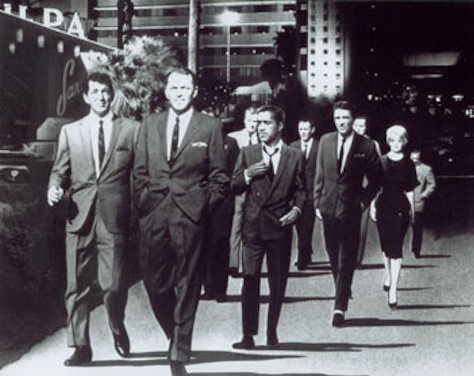
The road to Joey's began two days earlier in Pasadena, where a reporter called him cold from an ongoing TV critics "press tour" co-starring networks and their new seasons. Would he agree to an interview at his home? Well, yes, but only if he could talk about the TV Land cable network's repeats of his old sitcom, The Joey Bishop Show. "Not much of that Rat Pack stuff, though. I can't take all the dishonesty."
We agree to an 11 a.m. appointment in deference to his ill wife, Sylvia, who is usually napping at that hour. The 90-minute southward journey from Pasadena runs through Anaheim and Santa Ana to one of California's ends of the earth, posh Newport Beach. From there, it's a short jaunt across a bridge to Lido Isle, where Joey and Sylvia have lived within diving distance of Newport Bay for the past 28 years.
En route, it's easy to imagine a foreboding, Col. Kurtz-like figure waiting at the end of a modern-day Heart of Darkness. Would he greet his guest with open arms or at arm's length? And might the mere mention of the Rat Pack send him glowering into silence?
Sylvia answers the door and summons her husband, who barely resembles the Joey of old. His hair, mostly white, balloons at the sides as though it's just been suctioned by a mini-vac. He wears a brown V-neck shirt with a La Quinta logo and noticeably stained pants of roughly the same color.
The family cat, 12-year-old Misty, lies on her favorite, well-clawed living room chair. Bishop proudly notes how she covers her eyes with a paw to ward off sun- or lamp light. He then offers a soft drink before we head upstairs through a gauntlet of plastic plants, one for each step.
It's here, in his combination study/museum, that Bishop houses more than ample proof of his past stardom. There are framed autographed pictures of every president from John F. Kennedy to Bill Clinton. In the HBO film The Rat Pack, Kennedy is portrayed as a vacuous playboy who slept with mob moll Judith Campbell after being introduced to her by Sinatra. Ever happen?
"How would I know?" Bishop replies. "if I don't see a guy doin' it with a broad, I ain't gonna say yes or no. But what does it matter? (Franklin D.) Roosevelt had a broad. (Dwight D.) Eisenhower had a broad who drove a jeep for him. I didn't hear anything about that."
He then volunteers an odd story about Richard Nixon, who guested on Bishop's late night talk show in the late 1960s.
"I knocked on the men's room door and asked Nixon, 'Can I please come pee with you?' He said, 'What?' I said, 'Well, years from now people will ask me how well I got to know you. And I'll say, 'How well? We peed together!' But he wouldn't let me in! He thought I was serious!"
Plaques from numerous service organizations cite Bishop's unwavering generosity. His comedy charity bouts with boxing greats are commemorated with pictures of Sugar Ray Robinson ("he was a sweetheart") and Rocky Marciano ("the greatest fighter that ever lived, ya hear?"). And over on the left, "that's Vietnam there. I took whatsername with me. From the movie The Birds."
Tippi Hedren?
"What's it, Tippi? Tippi Hedren," he replies. "There she is right there. That's us in Vietnam. See it?"
There are numerous reminders of the Rat Pack as well, including a priceless poster advertising the fivesome's 28-night engagement at the Sands. Frank, Dino, Sammy and Peter are labeled the "four kings." Joey is "the most regal joker, who shuffled the king's men in the wildest shows ever dealt from any nightclub."
Bishop wants this underscored. "Shuffled the king's men. See?" he says. "But I never got any of this credit. Because who's Joey Bishop?"
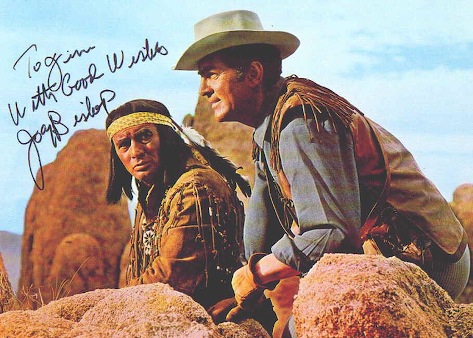
Throughout our almost four-hour meeting, he keeps running up his credit card. Whatever the question or subject, Bishop invariably steers it toward something he did to steal the show, break up the house or make someone else look good. Frank, for instance. He begins singing one of Sinatra's old tunes while interjecting the one-liners he deployed to keep everyone in stitches. It was pure Rat Pack humor and it went like this:
"I'm not much to look at," sang Frank (You can say that again, opined Joey.) "Nothing to see" (If you stand sideways they'll mark ya absent.) "I'm glad I'm livin'." (Dean, he thinks he's alive!) "And happy to be. I've got a woman." (He found a broad!) "Who's crazy 'bout me." (She must be nuts.) "She's funny." (She's queer.)
"Ya see, I could get away with carte blanche," Bishop says. "Frank liked it so much that he told me to do it every night. I didn't have to ask if it was all right."
There was that night with Sammy, too.
"I'll tell you the funniest line I think I ever did," Bishop says. "He was doing a benefit for the NAACP in Atlantic City. And he had a team called Stump and Stumpy. They were great dancers and very good comedians. but they couldn't make it that night, and Sammy called me. There were 6,000 black people there. I looked out at the crowd. then I looked back at him and I said, 'Jewish crowd, my ass.' You never heard black people laugh that hard."
As for Dean, "I gave him the funniest line a performer ever had. When he came onstage, I told him the band would vamp for 10 seconds. Then he would walk over there and ask, 'How long have I been out here?' He had just walked out! You never heard a laugh like that. I helped Dean a lot."
He seizes the moment to tell his interviewer what's funny, what's not. And why he was.
"The secret of comedy," Bishop says, "is when the audience can't wait to hear what you're gonna say. I see them doing comedy now so loud. My conception of true comedy is to be overheard, not heard. That's what made the Rat Pack so great."
He later plays an old interview with comedy legend Stan Laurel, who told a biographer that Bishop was his favorite because "he's very natural. He's not loud and he's very, very witty."
Asked when the interview was recorded, Bishop briefly becomes agitated. "You notice how you didn't make a single comment?" he asks in turn. "You didn't say anything. You didn't say, 'Geez, that's quite a compliment.' "
Then he reads another compliment from an old magazine article. This one praises him for being "the only member of Sinatra's gang who can tell the leader what to do with himself."
Did that mean he knew Sinatra well enough to know his moods?
Bishop bristles anew at any insinuation he was subservient.
"I didn't know Frank well. I knew me well. What you're saying is I was catering to him. You're saying I knew Frank well enough so I knew how to handle him. No, I knew me well enough, how to handle me. If he didn't like what I said, it's still me. Do you understand the dishonesty in your particular business? I don't know if you understand it."
But it's time for lunch. Bishop makes himself a chocolate milk shake to go with a hard-boiled egg and chocolate pudding from a sealed plastic cup. At Bishop's suggestion, his guest has a ham sandwich and pudding. Misty the cat sits on the kitchen table and watches us eat.
Joey, who says he's never had much of an appetite, still works out on a punching bag in his garage. It might help if he'd affix a picture of Johnny Carson, Jerry Lewis or Regis Philbin. Bishop doesn't care for any of them. His disdain for Carson dates to 1965, when Frank, Dino and Sammy did a benefit in St. Louis for St. Dismas House. Johnny stood in for an ailing Joey.
"I was in the hospital and I'll never forgive Johnny for saying that I hurt my back bowing to Sinatra. He was way out of line. If he wanted to say that, he could have also said, 'Joey, get well.' Johnny didn't know his place that night. I knew my place, you understand? And he had a great deal of respect for me, Frank did."
Bishop says he unequivocally "despises" Lewis for supposedly "making a stooge out of Dean" during their famed comedy partnership. And he still considers Philbin "an ingrate" for walking off their late night talk show during a salary dispute and then later bad-mouthing Bishop in a book.
"In the Hebrew religion, ingrate is the worst," he says. "I once told an interviewer that Regis is terrific. He gives lots of hope to people who have no talent."
Bishop says his favorite comedians were humanitarians as well. Danny Thomas. Bob Hope. Jack Benny. George Burns.
"In my view, in addition to being a great comic, you had to be a great human being," he says. "I didn't care how funny a guy was if he was not a nice person. It always seemed to me that his humor was false. I can't explain it any other way.
"Frank was Frank," he adds. "There was no phoniness . . . When we were playing at the Fountainbleau Hotel in Miami Beach, I went to my suite and saw a 19-year-old girl ready to jump off the balcony if she didn't get to meet Sinatra. It was 2:30 or 3 in the morning, and she had given the bellhop 10 bucks to let her in. I told her I'd see what I could do for her. I went to Frank's suite, but he was already in bed. Joe DiMaggio was playing cards with some people, though, so I told them. But Frank overheard what was going on and said he'd be right over. He came with flowers and a picture and invited her to the show with her mother and father. 'Joey, take care of the reservations,' he said. "That's Frank Sinatra.
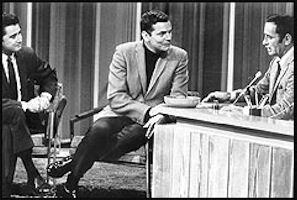
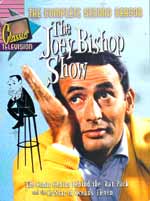
Bishop didn't attend the funerals of either Martin or Davis. "Funerals are too phony," he said in a previous interview. "I hate phoniness."
But he went to Sinatra's last rites, even though he emphatically answers "No" when asked whether the Rat Pack leader's death hit him hard.
"They had a thousand gardenias on the casket," he says. "One thousand gardenias on the casket! And I visualized him being in there and couldn't believe that he was dead. And yet I was grateful that he wasn't suffering anymore. If anybody liked to live, it was Frank. And to deprive him of living -- that's not living for him, being in a bed. You understand?"
We wind down our visit by watching a tape of Bishop's old sitcom, an episode in which the late ventriloquist Edgar Bergen guest-starred. Bishop watches approvingly, obviously enjoying his comedic timing and ways with words.
"Have you noticed how conversational this is?" he asks rhetorically. "Not punching or trying to sell to an audience."
He earlier has declined to watch a tape of HBO's Rat Pack movie, in which he's barely a bit player. As usual, the other four members get the lion's share of attention while Joey, played by comedian Bobby Slayton, is reduced to hapless one-liners such as, "Hey, Frank, no part for a brilliant comic who never knows when to shut up?"
"Shut up," HBO's Frank retorts good-naturedly.
The real-life Joey Bishop prefers to remember the time he fed John F. Kennedy a great opening line tied to his controversial Catholicism.
"He said to me, 'Joey, I have to introduce you. Could you tell me what to say?' I reminded him that he promised not to allow his Catholicism to in any way affect his political positions. So I told him he could say, 'Wouldn't you know, with my luck, the first speaker I'm introducing is a Bishop.' "
"He hugged me. He kissed me. You understand?"
"And he got such a hand when he said that."
Chip Moody: He lived to anchor -- and died too soon
11/10/07 18:18
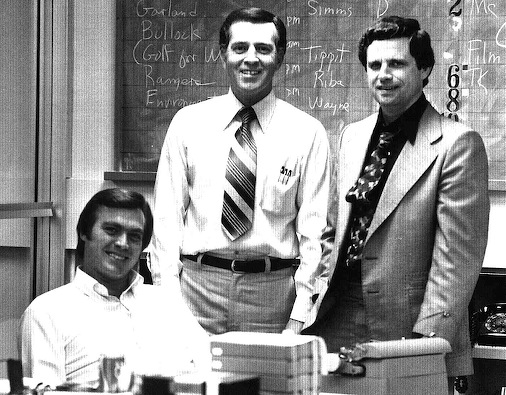
Note to readers: This is one of my all-time favorite articles. It captures Chip Moody at the height of his charm, but at a low point as well. Two years after its publication (Dec. 27, 1999), Moody died at age 54 after a 15-year battle with Hodgkin's Disease. At the time this was written, he still dreamed of returning to Ch. 8 to re-breathe that rarefied news anchor air.
By ED BARK
DALWORTHINGTON GARDENS, Texas -- Glory be, we're in Chip Moody's Model A 1931 Ford convertible roadster, the one with the holiday wreath affixed to the front.
Sounds like fun, except the roadster has conked out and is sitting on a shoulder of Interstate 20 West on what's rapidly becoming a freezing late afternoon. Moody, wearing his "Second Chance" World War II leather bomber jacket, is tinkering under the hood, but to no avail.
So the photographer who'd been sitting in the rumble seat hoofs it off to a Texaco station about a half-mile east. There he'll phone Moody's incredibly understanding wife, Vikki, who had warned him not to take the vintage vehicle onto the freeway.
Hundreds of motorists whiz by before she arrives to tow the antique back home. Finally, one stops to see what's up. It takes the young man barely a moment to ask, "Hey, aren't you Chip Moody?"
Yes, he is.
Pleasure to meet you, sir."
Moody, who hasn't been on television since April, can't help but beam. And there you have him in a nutshell. Acting hale and hearty despite health problems that would have felled just about anyone else on the planet. Still headstrong to a fault, although insisting otherwise. Indomitable. And mighty happy to be reassured that people still recognize and remember him from days behind the anchor desk at WFAA-TV (Channel 8).
He is certain those days aren't over. And given what he's overcome -- Hodgkin's disease, massive internal bleeding, intestinal blockages, the removals of his spleen, appendix, gall bladder and stomach -- it's foolish to doubt him when he says he'll be back in the saddle again. By the February "sweeps," he hopes.
"I think the trend is up, and I'm probably about 15 pounds away from going back to work," says Moody, who currently weighs 140. "If I'm doing OK physically, that's one thing. But if I look too gaunt on television, it scares or worries a lot of the viewers.
"That's a legitimate concern in the television business. If I can just get a little more stamina and weight, I'll be back in the starting lineup. That's where we all wanna go . . . I think I could go on the air and look fine at 155 pounds. I don't have that hollow-eyed, death camp look anymore. But at the same time, I don't have the muscle mass and body weight that I'd like to."
Channel 8 general manager Kathy Clements-Hill, who visited Moody at his home last month, worries that a February return might be too soon for the 52-year-old anchor.
"I hope -- oh, I hope -- he can be back," she says. "It's really up to how fast Chip recovers and how he feels and if he's healthy. The last thing I want to do is bring him back to work too early and have his health deteriorate. Our first priority is making sure he stays healthy."
After losing Moody indefinitely and fellow anchor Tracy Rowlett to rival KTVT-TV (Channel 11), the ABC affiliate added Scott Sams to a 10 p.m. newscast rotation that also includes John McCaa and Gloria Campos. Moody's return is still too hypothetical for the station to decide where to put him, Clements-Hill says. "But we have so much depth in our anchor team that a rotation of four is not out of the question at all."
Moody is still fighting back from the removal of his stomach in June at Baylor Medical Center. "That was a big operation," he understates. It was necessary because, in his words, "my stomach had become like a big, thin plastic bag from the grocery store that didn't empty. The best option was to get rid of an organ that just didn't work anymore."
Complications prolonged the surgery to 18 hours, twice as long as doctors had estimated.
"Then they kept me in a coma for a week so I didn't move around and goof up the little sutures and stitches inside of me," he says.
He spent seven weeks in the hospital and is still dependent on daily in-home intravenous feeding. It takes 14 hours for a bag of white fluid -- called Total Parenteral Nutrition -- to drip 1,800 calories into his body via a tube inserted in his chest. He begins the process daily around midnight and doesn't know how long he'll have to keep it up. So far, he's been unable to gain enough weight by eating little meals every two hours.
"When you're not hungry, that turns into a job," he says. "It's been a more difficult recovery than I'd hoped."
Still, he greets a visitor at 2 p.m. with what seems like boundless energy. The Moodys' two rambunctious dogs, Bear and Biscuit, are with him while he shows off the Model A that later will provide a truncated joy ride.
We're amazed he's still with us," says Vikki Moody. "The doctors have said that any other man would have been gone long ago. He's got an amazing amount of fortitude. I think it's made everyone else in the family stronger."
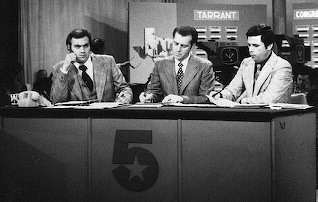
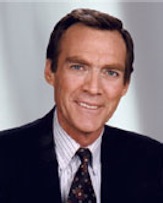
The family also includes son Trae, 24, and daughter Tiffin, 23. Moody's father, Robert Phelps Moody, lives just three miles to the north. They're both pilots -- and cancer survivors.
It was 1986 when Chip Moody first discovered a lump in his throat that had nothing to do with sentiment. He was anchoring in Houston after tours at two Dallas stations -- KXAS-TV (Channel 5) and KDFW-TV (Channel 4).
The diagnosis was Hodgkin's disease. Before the year ended, Chip, his father and mother, who's since died, all were undergoing cancer treatments in Houston.
By September 1987, after a 16-month recovery period, Chip returned to Dallas to join Channel 8's news team. He had been warned by doctors, however, that the cancer treatments "might give me some trouble down the road with some of my other organs. But they told me that if I didn't take the radiation, I wasn't gonna get down the road."
His intestinal problems began in the early 1990s and have put him in and out of hospitals ever since.
"I guess I've been blessed with a pretty good fighter-pilot mentality," says Moody, whose passions are plains, trains and automobiles. "I do keep kind of bouncing back. After about four of these operations, I'm getting a little bit weary of it. But I can still laugh. I don't party like I used to, but I've got a pretty good outlook on life."
His vigor is often what gets him into trouble. The three-acre Moody spread, just west of Arlington, has plenty of trees to trim and a sizable lawn to mow. And it almost kills him inside to let someone else do this dirty work.
"It's easy to get lazy and sit around. And I just hate it," he says. "It's not me. I get mad at myself. But at the same time I have to listen to Vikki and my doctors, who say I'm doing the correct thing. If I try to push it too hard, nobody wins. I can't expect to just jump back into things, so I'm pulling the throttle back a little bit. But it's not easy for me to do!"
No, it 's not. Moody's left arm still has some angry-looking scabs. They aren't from various medical treatments or malnutrition, he assures.
"I kind of ripped myself up on a couple of tree branches," he says. "I got a new electric saw and I just went crazy one day."
He laughs, and it's impossible not to join him. But is he deluding himself? Should he give up on the idea of anchoring again? Or is that what sustains him?
"At 52, I'm awfully young to think about retiring," he says. "And hopefully, people in the viewing audience think that maybe I'm only about 46. But yeah, that's keeping me going right now. Although it" -- his voice falters -- "has crossed my mind a couple of times that maybe for longevity's sake I oughta hang it up as an anchor. I think I would have to be mired in a really chronic lack-of-weight situation for that to be a serious consideration, though. On my worst days, I haven't even had the steam to get out of bed."
But he's encouraged by what he sees as slow, steady progress. And buoyed by thousands of get-well cards and letters of encouragement.
"If I had 5 pounds for everybody who offered me 10 pounds of their weight, I'd be like the Michelin man," he says.
"He's just got a longer road to hoe this time," says Vikki. "But he's Chip. That's the only way to explain it. He's a unique individual and he just doesn't believe that he's as sick as he is, or that it's something that can't be overcome."
A half-hour later he's in the Model A, cruising, then chugging, before finally pooping out. Chip Moody wants the same outcome for himself, only in reverse order. And his full-blooded heart has never stopped telling him that this is truly meant to be.
"I'm building up steam," he says. "I'm waiting for the engine to get up to speed."
Godspeed.
A yesteryear's TV newscaster survey -- except that quite a few are still at their appointed anchor desks
01/10/07 16:34
Note to readers: This September 1986 mail-in survey of readers' favorite D-FW news personalities and newscasts long pre-dated the Internet and for the most part, cable TV news. It required mail-in ballots, and they came in by the thousands during four separate "elections."
Here's the last of them. It lives on courtesy of a reader who re-discovered the 1986 survey -- perhaps during an archaeological dig -- and actually took the time to photograph and email it. It's reproduced here as large as possible, but a magnifying glass probably wouldn't hurt. Twenty-one Septembers later, vote-getters Tracy Rowlett, Clarice Tinsley, Dale Hansen, Jane McGarry and Gloria Campos remain very much a part of the local news landscape while Troy Dungan still pops in and out.
Note some of the tart comments from readers and Ch. 8's dominance in times when Rowlett, Hansen, Dungan and John Criswell were all major players at the station. Meanwhile, the late Chip Moody worked at Ch. 4 in the earlier '80s before going to Houston for a while. He then returned to Dallas in 1987 for a too-brief, health-plagued stay at Ch. 8.
Rowlett or Criswell won each of the four "Favorite News Personalities" contests; Dungan and Ch. 5's late, great Harold Taft always ran neck-and-neck in the top weathercaster competition. And your then mustachioed correspondent, with dedicated help from Norma Cavazos and Susan Verhault, always swore this was way too much work to ever do again. Finally we meant it.
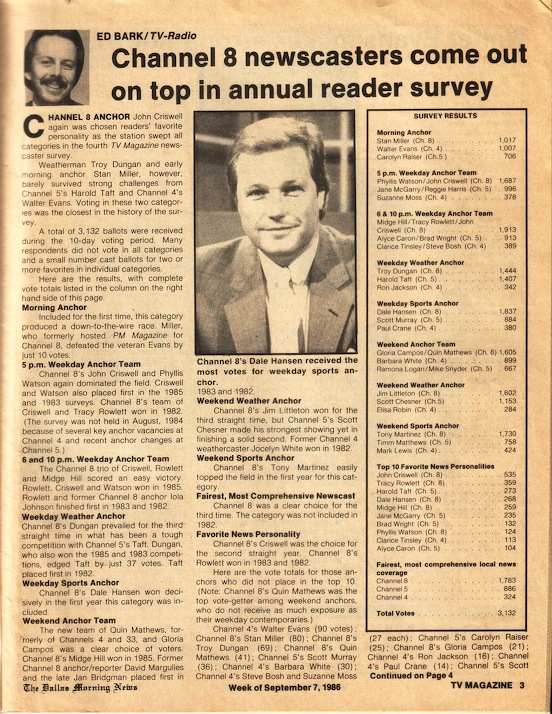
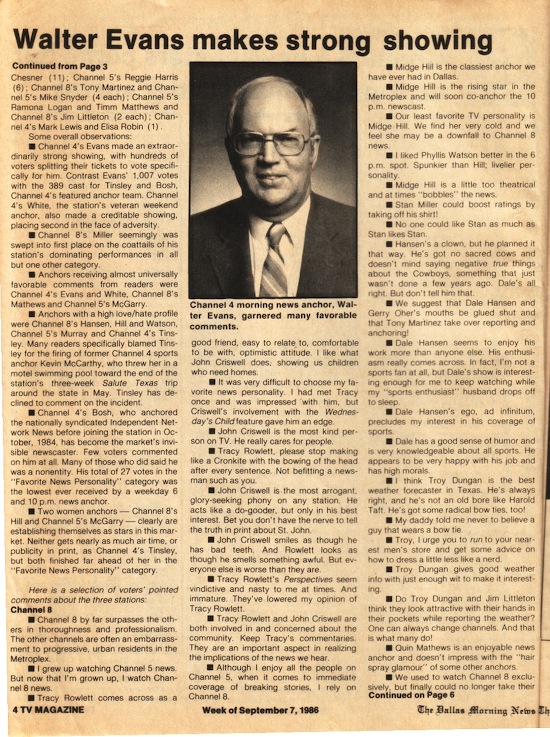
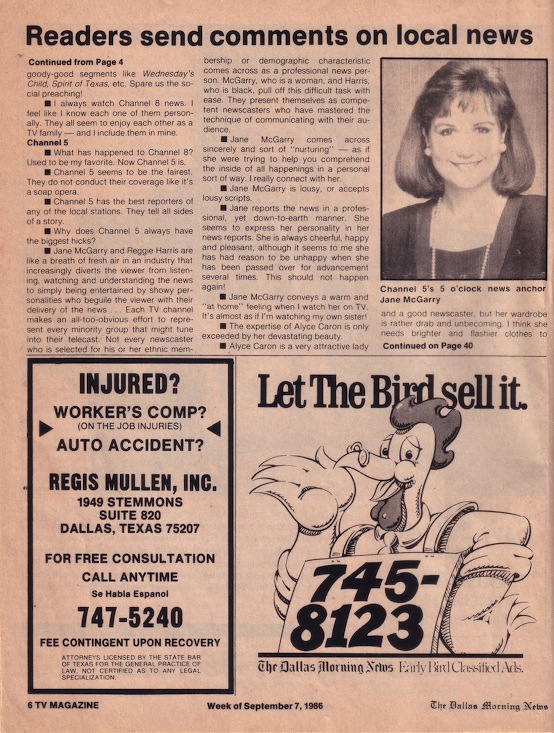
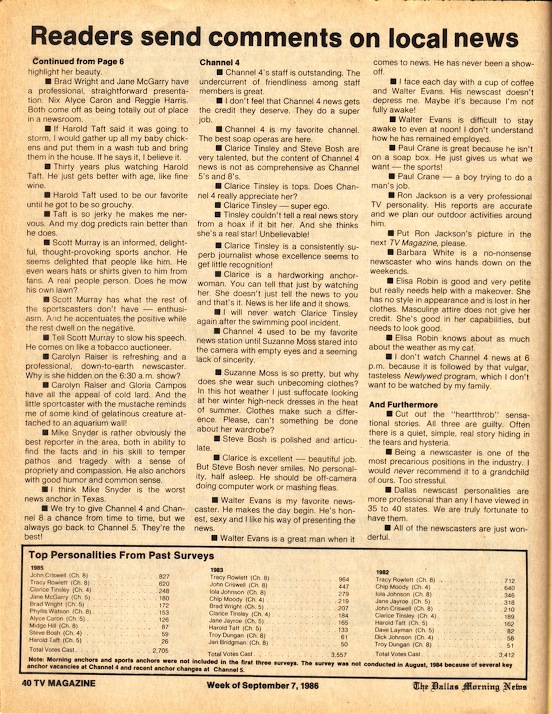
Here's the last of them. It lives on courtesy of a reader who re-discovered the 1986 survey -- perhaps during an archaeological dig -- and actually took the time to photograph and email it. It's reproduced here as large as possible, but a magnifying glass probably wouldn't hurt. Twenty-one Septembers later, vote-getters Tracy Rowlett, Clarice Tinsley, Dale Hansen, Jane McGarry and Gloria Campos remain very much a part of the local news landscape while Troy Dungan still pops in and out.
Note some of the tart comments from readers and Ch. 8's dominance in times when Rowlett, Hansen, Dungan and John Criswell were all major players at the station. Meanwhile, the late Chip Moody worked at Ch. 4 in the earlier '80s before going to Houston for a while. He then returned to Dallas in 1987 for a too-brief, health-plagued stay at Ch. 8.
Rowlett or Criswell won each of the four "Favorite News Personalities" contests; Dungan and Ch. 5's late, great Harold Taft always ran neck-and-neck in the top weathercaster competition. And your then mustachioed correspondent, with dedicated help from Norma Cavazos and Susan Verhault, always swore this was way too much work to ever do again. Finally we meant it.




